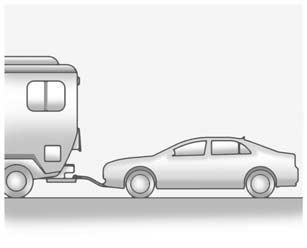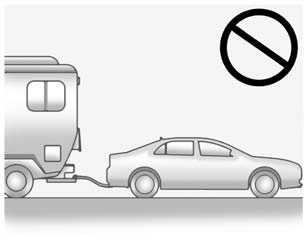
Chevrolet Sonic: Dinghy Towing All except RS Model with Automatic Transmission
Chevrolet Sonic Owners Manual
When dinghy towing a vehicle with an automatic transmission, the vehicle should be run at the beginning of each day and at each RV fuel stop for about five minutes. This will ensure proper lubrication of transmission components.

To dinghy tow the vehicle from the front with all four wheels on the ground:
1. Position the vehicle to tow and then secure it to the towing vehicle.
2. Shift the automatic transmission to P (Park) or a manual transmission into 1 (First) gear and turn the ignition to LOCK/OFF.
3. Set the parking brake.
4. To prevent the battery from draining while the vehicle is being towed, remove the following fuse from the instrument panel fuse block: (DLIS). See Instrument Panel Fuse Block for more information.
5. Turn the ignition to ACC/ ACCESSORY.
6. Shift the automatic transmission to N (Neutral) or a manual transmission to Neutral.
7. Release the parking brake.
Remember to reinstall the DLIS fuse once the destination has been reached.
Caution
If 105 km/h (65 mph) is exceeded while towing the vehicle, it could be damaged. Never exceed 105 km/h (65 mph) while towing the vehicle.

Caution
Towing the vehicle from the rear could damage it. Also, repairs would not be covered by the vehicle warranty. Never have the vehicle towed from the rear.
Other info:
Fiat Punto. Scheduled servicing
Correct maintenance is essential for ensuring long car
life under the best conditions.
This is why Fiat has programmed a series of checks
and maintenance operations every 20,000 km.
It is howe ...
Fiat Punto. Snow tyres
Use snow tyres of the same size as the normal tyres
provided with the car.
Fiat Dealership will be happy to provide advice
concerning the most suitable type of tyre for the
customer’s requirem ...
Peugeot 208. Additional adjustments
Head restraint height adjustment
To raise the head restraint, pull it upwards.
To remove the head restraint, press the lug A and pull the head restraint upwards.
To put the head restraint back in ...
Manuals For Car Models
-
 Chevrolet Sonic
Chevrolet Sonic -
 Citroen C3
Citroen C3 -
 Fiat Punto
Fiat Punto -
 Honda Fit
Honda Fit -
 Mazda 2
Mazda 2 -
 Nissan Micra
Nissan Micra -
 Peugeot 208
Peugeot 208 -
 Renault Clio
Renault Clio -
 Seat Ibiza
Seat Ibiza -
 Skoda Fabia
Skoda Fabia - Honda Pilot
- Volkswagen ID4
- Toyota Prius


